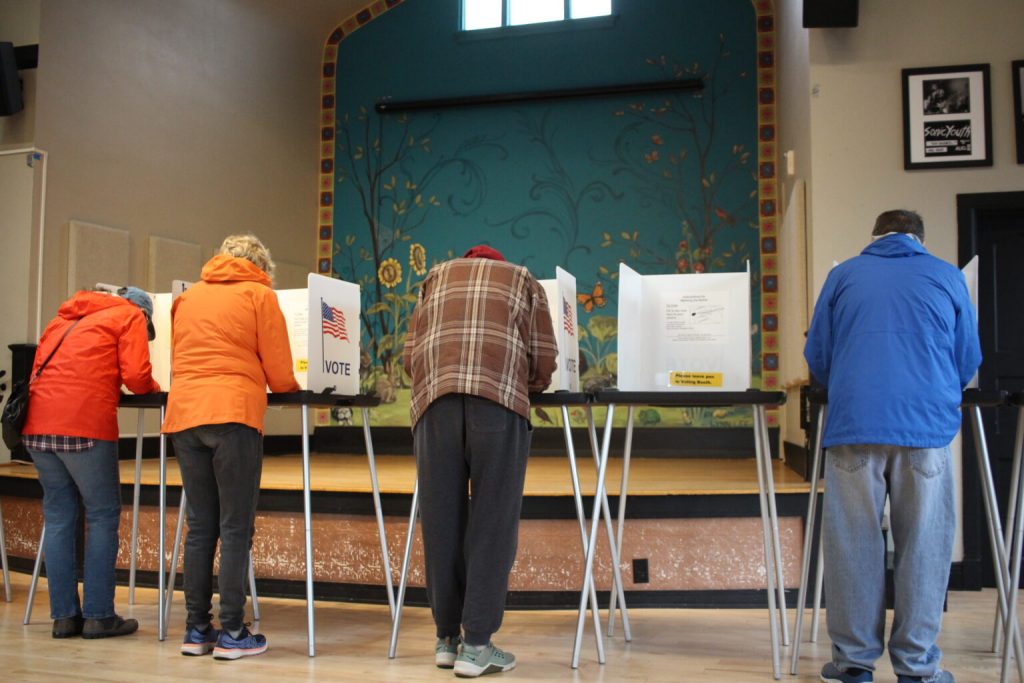Constitutional Amendment Would Double Down on Blocking Non-Citizen Voting
Liberal groups say Republican proposal is solving a problem that doesn't exist.

Voters at the Wilmar Neighborhood Center on Madison’s East side cast their ballots. (Henry Redman | Wisconsin Examiner)
On the ballot in Wisconsin this fall, voters will decide on a referendum asking to change one word in the state constitution to prevent non-U.S. citizens from voting in any local, state or federal elections. The effort is the Republican Legislature’s fifth attempt to amend the state constitution this year.
Republicans point to a handful of municipalities across the country that have allowed non-citizens to vote in municipal elections like school board races and say the amendment would prevent any Wisconsin communities from doing the same.
“Addressing this issue now will ensure votes are not diluted in the future,” Sen. Julian Bradley (R-Franklin) told Votebeat. “It’s best for the government to address this concern before it becomes a problem.”
Democrats and voting rights advocates say that non-citizen voting isn’t a real problem and that Republicans have shown no proof it is but continue to complain about it as part of their general anti-immigration push in this election. Plus, they say making changes like this by trying to amend the constitution makes an end run around the normal legislative process and Gov. Tony Evers’ potential veto, while making the state vulnerable to future efforts to make it harder for legal voters to cast a ballot.
“First and foremost, we have a system that works, and I think this is a solution in search for problems,” T.R. Edwards, staff attorney at the voting rights focused Law Forward, says. “Secondarily, it shifts the burden to the voter. … But then third, I think it’s yet another vestige of our gerrymandered Legislature and an escape to actually go through the legislative process to do things that have an actual debate about what works for our state.”
Currently the state Constitution says that “every United States citizen age 18 or older” can vote. If approved, the “every” would be changed to “only.”
“Shall section 1 of article III of the constitution, which deals with suffrage, be amended to provide that only a United States citizen age 18 or older who resides in an election district may vote in an election for national, state, or local office or at a statewide or local referendum?” the referendum asks.
Opponents to the referendum say it could lead to discrimination against Hispanic voters, who could be harassed and forced to prove that they belong in their communities. They also worry that changing the constitution could lead to future legislative attempts to require anyone registering to vote to prove they’re a citizen, which they say could disenfranchise legal voters who don’t have access to documents such as a birth certificate.
Edwards points to a recent Brennan Center study that found more than 21 million people across the country, 9% of voting age Americans, don’t have access to documents that would prove their citizenship.
“That number of people, including people like my grandmother when she first moved to the state, [would lose] one of our few things that I think makes us unique as a state, our ability to have same day registration, and we’ll put that in jeopardy,” Edwards says.
Recently, Republicans have moved across the country to warn about large-scale non-citizen voting in ways that would swing elections. Similar to other Republican claims about the election system, there is no proof that is happening. Studies of the voting system across dozens of communities involving millions of votes have found just a handful of cases of non-citizens casting ballots.
Earlier this year, Congress was unable to pass a federal budget over disagreements about a bill that would require citizens to prove their citizenship to register to vote.
State and local officials already have systems in place that determine if someone registering to vote is a citizen. In Wisconsin, people registering to vote must affirm they’re U.S. citizens. Lying about this when filling out the voter registration form is a felony that includes the penalty of deportation.
“We have so many checks and balances in this state, the people that are non-citizens, you think they would actually risk — like if they’re DACA recipients — do you think they would risk their status and get thrown in jail or even be deported just to go cast a ballot?” Nick Ramos, executive director of the Wisconsin Democracy Campaign, says. “Like, think about how absurd that is.”
A 2017 report from the Brennan Center for Justice analyzed votes cast in 42 jurisdictions accounting for 23.5 million votes. That report found that in the 2016 presidential election, after which President Donald Trump first raised claims of massive numbers of illegal votes, 30 incidents of non-citizens voting were referred to prosecutors — accounting for 0.0001% of the 2016 votes.
The Republican attempts to amend the constitution this year have had mixed results. This spring, two proposed amendments to limit who can work on and provide funding for election administration in the state were approved. But in the August election — after Democrats and advocacy groups in the state waged a public-education campaign to oppose two more amendments — voters denied an attempt to remove powers from the governor allowing him to spend federal emergency dollars.
Republicans’ constitutional amendment referendum seeks to stop non-citizen voting was originally published by Wisconsin Examiner.






















Can we propose a constitutional amendment to prohibit the proposal of all future superfluous constitutional amendments?
Please???